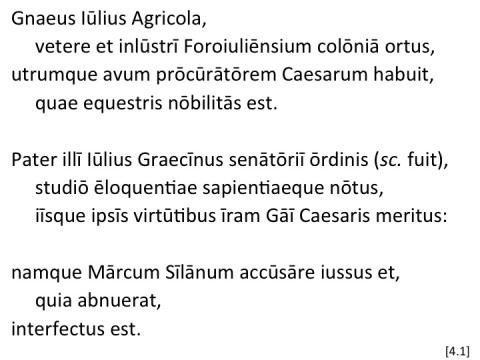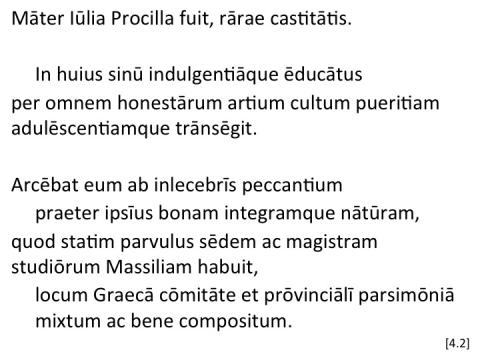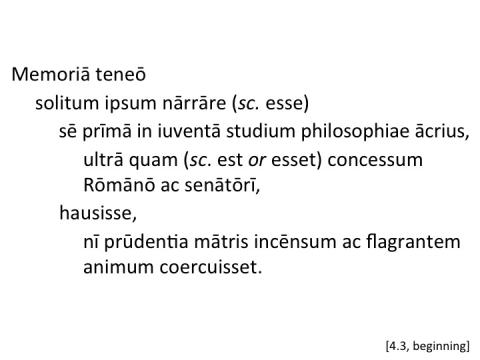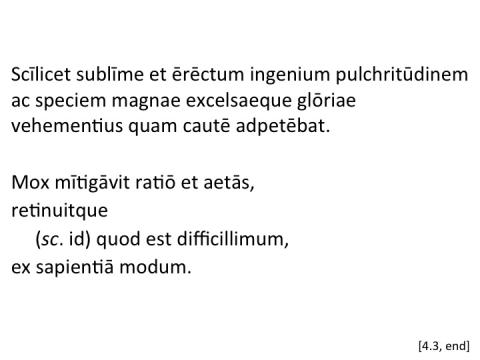[4.1] Gnaeus Iūlius Agricola, vetere et inlūstrī Foroiuliēnsium colōniā ortus, utrumque avum prōcūrātōrem Caesarum habuit, quae equestris nōbilitās est. Pater illī Iūlius Graecīnus senātōriī ōrdinis, studiō ēloquentiae sapientiaeque nōtus, iīsque ipsīs virtūtibus īram Gāī Caesaris meritus: namque Mārcum Sīlānum accūsāre iussus et, quia abnuerat, interfectus est. [4.2] Māter Iūlia Procilla fuit, rārae castitātis. In huius sinū indulgentiāque ēducātus per omnem honestārum artium cultum pueritiam adulēscentiamque trānsēgit. Arcēbat eum ab inlecebrīs peccantium praeter ipsīus bonam integramque nātūram, quod statim parvulus sēdem ac magistram studiōrum Massiliam habuit, locum Graecā cōmitāte et prōvinciālī parsimōniā mixtum ac bene compositum. [4.3] Memoriā teneō solitum ipsum nārrāre sē prīmā in iuventā studium philosophiae ācrius, ultrā quam concessum Rōmānō ac senātōrī, hausisse, nī prūdentia mātris incēnsum ac flagrantem animum coercuisset. Scīlicet sublīme et ērēctum ingenium pulchritūdinem ac speciem magnae excelsaeque glōriae vehementius quam cautē adpetēbat. Mox mītigāvit ratiō et aetās, retinuitque, quod est difficillimum, ex sapientiā modum.
notes
Overview: The lineage of Agricola; his early training and his education; his youthful devotion to philosophy.
4.1
Gnaeus Iūlius Agricola: this is the only certain instance in Tacitus in which the tria nomina Romanorum occur. They are designed to give to the beginning of the biography proper a special solemnity. (Gudeman)
Foroiuliēnsium colōniā: Forum Julii, the modern Fréjus, a town situated on the coast of Gallia Narbonensis, northeast of Massilia. It was founded by Julius Caesar in 46 BCE, and became an important port; hence, the adjectives vetere et inlustri. (Stuart)
prōcūrātōrem Caesārum: the procurators of Caesar were officials paid by him to represent his financial interests in the provinces, whether imperial or senatorial. As they were private agents of the Emperor, they could not be taken from the ranks of the Senators, who were in theory his equals. These officials were in virtue of their office "knights." (Pearce); the procurators were officers in the imperial household, appointed by, and solely responsible to, the emperor. These positions were originally held by freedmen and equites alike, but as the administrative functions of the emperor extended, the higher and more responsible procuratorships were given only to knights, who were then generally distinguished from the minor "procurators" as procuratores Augusti. Caesarum happens to be found only here, but Caesaris may have been equally official, the plural being used doubtless because the grandfathers referred to served separately under Augustus and Tiberius, or under both. (Gudeman)
quae: by attraction from quod. (Stuart)
equestris nōbilitās: as the holding of one of the old Republican curule offices conferred "nobility" upon the family of the holder, so by analogy the holding of a "knightly" office by Agricola's grandfathers is said to confer the "knightly nobility" upon their grandson Agricola. There were thus two distinct patents of nobility under the Empire. (Pearce); these offices had become one of the marks of an equestrian career, for men of senatorial rank were debarred from holding a procuratorship. The expression itself, in place of ordo equestris, seems not to occur elsewhere, and is here used in the same technical sense which Tacitus repeatedly gives to equites inlustres or insignes, namely, knights occupying high positions. (Gudeman)
Graecīnus: he probably attained the praetorship (see note on 6.4). He wrote a treatise on the culture of vines. (Pearce); in all probability he was descended from some Greek family in Marseilles, where Agricola was educated, and he may have been the son of Graecinus, the friend of Ovid. (Gudeman)
senātōriī ōrdinis: sc. fuit. (Damon); he may have gained admission to the senate by adlectio, i.e. formal appointment by the emperor, or he may have held a curule office, which secured his entrance. (Stuart); classical usage would require vir in apposition to the proper name for the genitive of quality to depend on. See note [below, 4.3] on rarae castitatis. (Pearce) [A&G §345]
virtūtibus: Seneca the philosopher said of Graecinus that he was so good that a tyrant could not afford to let him live. (Stuart)
Gāī Caesaris: better known as Caligula, the third of the emperors. (Stuart)
meritus: “incurred,” as elsewhere in Tacitus, unless with a touch of characteristic bitterness our author means to imply that in the case of Graecinus the reward of merit was the emperor's wrath. (Stuart); mereri is used by Tacitus in a neutral sense "to incur"; but here the ordinary sense of "deserving" is intended to give bitterness to the expression. (Pearce)
M. Sīlānum: M. Junius Silanus, the father-in-law of Caligula, consul suffectus, 15 CE, was driven to suicide 38 CE. He is repeatedly mentioned by Tacitus. (Gudeman)
abnuerat: the plupf. implies a lapse of time between the refusal and the punishment. This is borne out by the dates of the events mentioned here: iussus refers to 38 CE, the date of Silanus' death, and, as Agricola was born in 40 CE, his father cannot have died before 39 CE. (Pearce)
4.2
Iūlia Procilla: possibly a member of that family of Gallic aristocracy to which belonged Valerius Procillus, a chieftain mentioned by Caesar, BG1.19.3. (Stuart)
rārae castitātis: “of exceptional purity of character.” (Stuart); see note [above, 4.2] on senatorii ordinis. (Pearce)
in huius sinū indulgentiāque: hendiadys; “in the shelter of her fond care.” He was reared at his mother’s knee instead of being intrusted to a nurse. With the metaphorical use of sinus compare such English expressions as “in the bosom of the church” and “in the bosom of one's family.” (Stuart); “under her fond and personal care.” Sinus gives the idea of protection; indulgentia of maternal tenderness. (Pearce)
per omnem honestārum artium cultum: “in a complete course of training in the polite subjects.” Artes honestae or liberates were the studies that were fit for the Roman "gentleman and scholar" to pursue, namely grammar, music, geometry, rhetoric, and philosophy. The terms carried with them to a certain extent the implication conveyed by the English expression "The Humanities” in its current sense. (Stuart); omnem really goes with the whole phrase honestarum artium cultum, and is not simply omnium by hypallage. Translate “thorough.” (Pearce)
arcēbat: on the emphatic position of the predicate, see Introd. p. xxvi, #3. The subject is the following quod clause. (Gudeman) [A&G 572]
peccantium = vitii. The use of the participle for an abstract substantive is a Graecism, still rare in pre-Augustan Latin, but extremely frequent in later writers. In this treatise again, ch. 5.3, reciperatae, 32.4 servientium. (Gudeman)
quod: this whole clause is subject of arcebat. (Pearce) [A&G 572]
sēdem ac magistram: Tacitus is fond of joining a concrete and an abstract noun. See Introd. p. xxxiv, #1. (Gudeman)
integram: “unspoiled.” (Stuart); “untainted,” owing to his mother's care. (Pearce)
statim parvulus: Quintilian, the great teacher of oratory, a contemporary of Tacitus, recommended that instruction be begun in the fourth year. Another pedagogical theory declared seven as the proper age. (Stuart)
Massiliam: Marseilles, as we should expect from its Greek origin, had been a scholastic center for generations. Under the Empire, youths in quest of a university training often resorted there in preference to sojourning at Athens. (Stuart)
locum ... compositum = locum in quo Graeca comitas et provincialis parsimonia mixta ac bene composita erant. (Gudeman)
prōvinciālī parsimōniā: in the eyes of Tacitus and the satirists of his time, the provincials preserved the simple life, while Rome was the center of decadent luxury. Here, however, the remark is not a commonplace, for Strabo, a Greek geographer of the Augustan age, says that the frugal Massilians prescribed strictly the size of dowries and the amounts to be spent for jewelry and clothing. (Stuart)
mixtum: applied to the place itself, instead of to the factors which compose the place. ... Cicero speaks of the disciplina and gravitas of Marseilles. (Pearce)
4.3
solitum ipsum: sc. esse, with narrare as a complementary infinitive. (Damon) [A&G 456]
philosophiae: this word (like philosophus) is rarely used by Tacitus. See note ch. 2.2. The apathetic and, at times, hostile attitude of the Romans toward the study of philosophy is well attested. See ... especially Suet. Nero 52. (Gudeman)
ultrā quam: sc. est or esset. The mood will be indicative if the clause stands outside the indirect statement, subjunctive if it is included within it. (Damon) [A&G 583]; explanatory of the adverb acrius, “too ardently,” that is to say, “beyond,” etc. (Stuart)
Rōmānō ac senātōrī: senatorial dignity did not sanction participation in certain pursuits which in the case of other social classes carried no stigma. Statesmen and men of affairs were discouraged from obtaining anything beyond a smattering of philosophical knowledge, for fear their attention might be diverted from the business of active life. (Stuart); ac, “and moreover.” Senatori, i.e. a future member of the Senate, which as embodying the Roman ideal of gravitas might be expected to keep itself free from notions regarded as foreign and fanciful. Philosophy was exotic in Rome, and was always studied from the point of view of practice rather than of metaphysical speculation. The concluding words of this chapter help us to understand the motive of the Agricola. Philosophy had led to the inconsiderate attacks on the government which had so often proved fatal to the philosophers. Agricola was well advised in giving up its dangerous lessons, and preserving only moderation as the outcome of its teaching. Tacitus is perhaps excusing the action or inaction of the "moderates," men who tolerated Domitian's misrule, by a side attack on the reactionary party who found the whole duty of a Roman exemplified in Thrasea. (Pearce)
hausisse: as we say "absorbed," "drank in"; hausisse represents hauriebat in direct discourse. The sentence involves an ellipsis of the logical apodosis of the unreal condition ni ... coercuisset; thus, “he was on the point of absorbing ... and he would have done so, had not,” etc. Such "suppressions of the apodosis” are not rare in Tacitus. See note on chapters 13.2, 37.1. (Stuart) [A&G 517b and 589b] (studium) hausisse = (studio) se dedisse. The infinitive represents hauriebat in direct discourse; hausturum fuisse must be supplied in thought as the apodosis to ni ... coercuisset. So ch. 13.2, agitasse satis constat. See Introd. p. xxxii, #6. (Gudeman)
incēnsum ac flagrantem: sc. studio philosophiae. Incensus, in its metaphorical sense, is extremely rare; flagrans exceedingly common. Observe the accumulation of synonyms in this closing paragraph. See note on Introd. p. xxix, #15. (Gudeman)
pulchritūdinem ac speciem: “the beauty and perfection.” Tacitus draws on philosophical terminology. (Stuart) speciem: “ideal.” Species means (1) that which is seen in a thing, the outward appearance, 24.3 specie amicitiae; (2) that which the mind sees in a thing, apart from its outward manifestation. So here. (Pearce); “beautiful ideal.” Hendiadys. (Gudeman)
vehementius quam cautē = magis vehementer quam cautē (a difference of kind). (Pearce) cautē: that the caution was necessary is evident from the punishment which some emperors inflicted upon philosophers. See note ch. 2.1, 3.2. (Gudeman)
ratiō et aetās: a hendiadys, “the calculation which comes with years.” (Pearce); “prudence that comes with age.” On the epexegetic et, see Introd. p. xxx, #18. The singular predicate with two abstract nouns joined by et is the rule in Tacitus. Where the verb in the singular precedes it may be supposed to agree with the nearer subject. When the subjects are joined with ac or atque, we find the plural, as in ch. 42.1, exceptions being very rare. (Gudeman)
modum: the ethical doctrine of the "mean," ... is here applied to practical life. See note on Romano ac senatori, 4.5. See note on 42.4 for the application of this principle to Agricola’s conduct. (Pearce)
vocabulary
Gnaeus –ī m.: Gnaeus
Iūlius –iī m.: Julius
Agricola –ae m.: Agricola
illūstris illūstre: bright, famous
Foroiuliensis –ense : Foroiuliensian, from Fréjus
colōnia colōniae f.: colony
avus avī m.: grandfather
prōcūrātor –ōris m.: procurator, governor, financial officer
Caesar Caesaris m.: Caesar
equester –tris –tre: of cavalry, of the equestrian order
nōbilitās nōbilitātis f.: nobility
Graecīnus –ī m.: Julius Graecinus
senātōrius –a –um: senatorial
ēloquentia –ae f.: eloquence, oratory, correct speech
Gāius –iī m.: Gaius Caesar, emperor 37-41
mereor merērī meritus sum: to earn
namque: for in fact
Marcus Marcī m.: Marcus
Sīlānus –ī m.: Silanus
accūsō accūsāre accūsāvī accūsātus: to accuse
abnuō abnuere abnuī abnuitūrus: refuse
Procilla –ae f.: Julia Procilla
castitās castitātis f.: chastity, purity, integrity
indulgentia –ae f.: loving care
ēducō –ēducāre –ēduāvī –ēducātum: to bring up, train
pueritia pueritiae f.: boyhood
adulēscentia –ae f.: youth
trānsigō trānsigere trānsēgī trānsāctum: to pass
arceō arcēre arcuī: to keep away
illecebra illecebrae f.: allurement
quod: in that, the fact that, because
parvulus –a –um: very small, still a child
magistra –ae f.: mistress, teacher
Massilia –ae f.: Massilia, Marseille
Graecus –a –um: Greek
cōmitās –ātis f.: affability, camaraderie, congeniality
prōvinciālis –e: provincial
parsimōnia –ae f.: thrift
iuventa iuventae f.: the prime of life
philosophia philosophiae f.: philosophy
Rōmānus –a –um: Roman
senātor senātōris m.: senator
hauriō haurīre hausī hastus: to drain, drink deep of
nī: unless
prudentia prudentiae f.: prudence, good sense
incendō incendere incendī incensus: to set fire to, excite
flagrō flagrāre flagrāvī flagrāturus: to burn, be enthusiastic
coerceō coercēre coercuī coercitus: to constrain, restrain, restrict
sublīmis sublīme: elevated, exalted, lofty, distinguished
ērigō ērigere ērēxī ērēctus: to raise, rouse, set up
pulchritūdō –inis f. : beauty
excelsus –a –um: lofty, exalted
vehemēns: impetuous, ardent
cautus –a –um: cautious, discreet
appetō appetere appetīvī appetītus: to aim at, seek, covet
mītigō mītigāre mītigāvī mītigātus: to tone down, lessen




